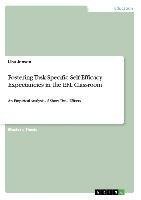
-
 Anglický jazyk
Anglický jazyk
Fostering Task-Specific Self-Efficacy Expectancies in the EFL Classroom
Autor: Lisa Jensen
Master's Thesis from the year 2012 in the subject Pedagogy - Pedagogic Psychology, grade: 1,0, University of Hannover (Pädagogische Psychologie), language: English, abstract: It is commonly known that one of the major factors for successful learning is the... Viac o knihe
Na objednávku, dodanie 2-4 týždne
44.37 €
bežná cena: 49.30 €
O knihe
Master's Thesis from the year 2012 in the subject Pedagogy - Pedagogic Psychology, grade: 1,0, University of Hannover (Pädagogische Psychologie), language: English, abstract: It is commonly known that one of the major factors for successful learning is the motivation to learn. The constant issue for teachers, therefore, is how they can motivate their students to want to learn. The primary motivation for any learning is interest in the subject. Since all humans are interested in different domains, it is unrealistic to expect school students to be interested in, on average, ten different subjects which they have to study according to school curricula. Consequently, teachers try to motivate their students extrinsically and it can safely be said that success is one of the major sources of extrinsic motivation. Generally, people like to do what they are good at. The opposite is also possible - the student is interested in the subject but lacks success and therefore becomes unmotivated. So, how can students succeed in subjects they are not overly inter¬ested in or maintain their interest despite failures? Researchers in the field of educational psychology have been trying to find an answer to this question and many more questions concerning motivation theory. During the last few decades, the concept of self-efficacy has emerged and has become more important in research on learning. Simplified, self-efficacy is the confidence for being able to cope with tasks. It is said to be closely related to academic performance and to influence motivation by making the learner feel self-confident or insecure. The connection between self-efficacy and achievement has been researched in a number of studies, which will be summarized and discussed in an empirical research chapter. The influence of self-efficacy on motivation, however, has only theoretically been argued for. The research trying to show a causal relation between these two concepts is generally criticized for not measuring motivation directly but by measuring performance, goal-setting or self-regulation and equating these concepts with motivation. Despite the problems that arise when research is trying to operationalize motivation (Gardner 2007), self-efficacy is said to have an influence on it and is regarded as one of the major concepts in learning theory.
- Vydavateľstvo: GRIN Verlag
- Rok vydania: 2013
- Formát: Paperback
- Rozmer: 210 x 148 mm
- Jazyk: Anglický jazyk
- ISBN: 9783656372776




 Nemecký jazyk
Nemecký jazyk 







 Španielsky jazyk
Španielsky jazyk 